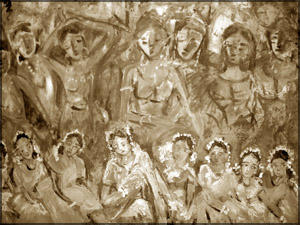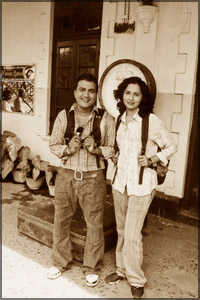Paint with brush and pen
Glimpse into Shireen's world of creativity:
 Shireen
Senadhira is a prolific writer as well as a versatile painter. At times,
she captures landscape, human figures with a stroke of brush on the
canvas and at another, she codifies the diverse landscapes of humanity
and different mindscapes through her elegantly written and perception
studded short stories and poems. Shireen
Senadhira is a prolific writer as well as a versatile painter. At times,
she captures landscape, human figures with a stroke of brush on the
canvas and at another, she codifies the diverse landscapes of humanity
and different mindscapes through her elegantly written and perception
studded short stories and poems.
In her collection of poems and short stories 'Ehela Ablaze', she
paints diverse mentalities and celebrates splendours of nature in its
pristine glory. Her stories are peopled with characters from life with
full of flesh and blood and woven with elements such as mystery, pathos
and compassion towards fellow beings.
 "There
were other times "There
were other times
the Ehela was ablaze
with hidden lighting,
swaying to wafting melodies,
enticing twinkling stars
I remember a well-kept garden
Filled with happy bustle
Of elegant young,
Eyes shining, bursting with exuberance,
Treading the threshold"
Here in her titled poem "Ehela Ablaze" she craftily transforms a
common place experience of splendour of nature into a collective
experience against the change of time. Every thing but 'Ehela Ablaze'
has changed ' to brave the menacing weeds'.
 Q:The
title poem 'Ehela Ablaze' is more or less a celebration of nature in its
pristine beauty. You have compared the 'Ehela Ablaze' to 'smiles of my
friends' thus juxtaposing splendour of nature with your friend's smile. Q:The
title poem 'Ehela Ablaze' is more or less a celebration of nature in its
pristine beauty. You have compared the 'Ehela Ablaze' to 'smiles of my
friends' thus juxtaposing splendour of nature with your friend's smile.
What inspired you to pen this poem?
A: This is how it happened. When I was living abroad I did come home
frequently. On our visits here, I felt the country had changed
considerably. I looked with dismay at the road barriers, having to show
identity at road check points where soldiers were armed with guns. This
is not beautiful Sri Lanka said my heart, this is some war torn country.
Even some of the places I used to visit were time ravaged and
deteriorated.
Certainly not like the places I remembered. In this frame of mind,
even the country's people seemed aggressive. Though the change was
painful to me, it was there, it was reality.
During this time I visited a long ago favourite place of mine and
found that the garden, and the house were thoroughly neglected. I
remembered the good times I had there and felt sad. Then, all of a
sudden I saw the Ehela tree blazing, full of sunshine flowers amidst
weeds. There was hope. It was as if the tree had a message for me. It
had withstood the neglect. Do look around Colombo roads from end
February to May and you will see the pendulum flowers swaying blithely.
I am sure you will be filled with gladness too.
In the same manner, when I looked at my friends and their smiles, I
saw that inspite of the trying times, they had not changed either. I
remembered the Ehela tree.
Q: 'Into the Mist' is also a poem which is really like a picture in
words.It seems that you have a penchant for celebrating nature and to
enjoy it in a most artistic manner. However, the last stanza of the poem
contrasts the sublime environment of Haputale with turmoil in Colombo.
A: I am so glad that you say this poem is like a picture in words.
That is exactly what I aimed to do. To paint to the reader a picture in
words. I can also do vice versa. I can look at a picture and tell you a
story of it.
Even now, some of my friends ask me to quit when I go into some
lengthy explanation about some scene or a picture.
Haputale mentioned in this poem is such a favourite place. It has a
'forever view' of the Haputale pass which changes colour during the day.
It also has its woods that lie above the Haputale area. But even this
splendour could not make me forget the surmounted problems in Colombo as
our country is not peaceful at all and it is to Colombo we come back
after the holidays.
Q: 'Coffee Mate' is a story which reminds us of impermanency of life.
Once a colleague or a friend departs the world, memories of him or her
vanishes as dew drops on a blade of grass. Is this story born out of
experience?
 A:
Yes, it is partly experience. I did some Lions work earlier with a
number of street children. We saw to their nourishment and clothing.
This was a project among many others. It took time but we arranged for
some instructions to be given to them. We also helped some older
children to get training for jobs. Some of them were bright kids and
they would have thrived in different circumstances. It was satisfying
that they were placed in the care of a temple nearby A:
Yes, it is partly experience. I did some Lions work earlier with a
number of street children. We saw to their nourishment and clothing.
This was a project among many others. It took time but we arranged for
some instructions to be given to them. We also helped some older
children to get training for jobs. Some of them were bright kids and
they would have thrived in different circumstances. It was satisfying
that they were placed in the care of a temple nearby
Impermanence of life in this story is with the character, Nimi. One
day he's there in Pettah and the next day, gone. When people depart the
world, their memories fade away with time. It is only the near and dear
ones who surface in our memories from time to time. Giving alms and
prayer services help in keeping their memories alive. I remember when
young, and life was not so rushed, events like giving of alms and
services for the dead were plentiful and arranged with care.
Q: "After the Massacre" reminds us of grim reality with which we lead
our lives. Here is a rare occasion you have the same symbol of Araliya
to express contradicting emotions, on one occasion the happy moments of
children weaving garlands of Araliya and on another painful parting of
children from the world. Can you comment on the Kabithigollawa massacre
that prompted you to pen the poem?
A:Any massacre is a grim reality. If you do see such a horrific
scene, you'll see the dead bodies in their gruesome positions. The
little bodies of children are so pitiful. The little ones simply had no
chance for their innocence, childhood and playfulness to flower. It does
not matter what colour or race they are. Actually, under the sod or over
it, we are the same.
It is very upsetting to view such scenes. I remember, bodies lying on
the side of roads beyond Galle at the turn to Kananke during 1989 and
thereabouts. Do you remember the bomb blast of Central Bank? There were
part of bodies and whole limbs lying strewn near the clock tower of
Colombo Fort. These were the happy streets that we walked in the past
and it was a treat to come to this area. Whenever the Fort is mentioned
it is the horrible scenes that come up and those will be never be
erased. So, when the Kebithigollawa massacre happened, all these
memories surfaced and the scenes of bountiful historical environs of
Anuradhapura went haywire for me.
I just had to get it out in some kind of writing.
Q: The short story 'Day's Work' is about the kind of detachment that
journalists maintain in reporting events specially those relating to
victims of war. Can you recall the incident behind the story?
A: In the Wadiya Group of writers we meet with journalists on and off
at our meetings. It was when talking to a couple of young journalists
who were covering the war in the north that I felt how they worked. One
needs a kind of detachment when reporting news and incidents of war.
Otherwise, how could they go on with their job? Some time in the past,
before I wrote the story, a group of terrorists were chased northwards
from the Batticaloa area by our armed forces. I just combined the two
aspects for this story.
Q: "The Old House" is another story where sentimental value is
emphasized against the commercial value of a piece of land. As per the
saying, there is a spirit and character to a house. An Old house may
contain load of memories for those who have spent their happy days. How
did you conceive the idea for the short story and are you of the view
that younger generation are losing an important aspect of emotional
life?
A:As you can see Expressway and The Old House are protests in story
by me.
However, the path of progress needs much sacrifice. It becomes a
tussle when the heart rules over the head or vice versa.
The younger generation hardly know such places. They grow up in a
modern age with new technology at their finger tips. If you talk of a
place, they would bring it up in the computer screen in a matter of
seconds and view it with disenchantment and give their ideas on it.
There is no emotion involved for them. I like it my way and they like
their way. Most times, the youth look at us with a kind of hasty
kindness and condescend to give some of their time to listen to fond
elders.
Q:"Ruby Red Pomegranate" is a poem which assigns different nuances to
'ruby red'. I would say it is like a tapestry skilfully woven around the
myriads of emotions. Your comments
A:The story of Madduma Bandara's beheading in history of Sri Lanka
has never left me. I couldn't believe it at first. He was my hero when I
was the same age as he was. I even acted the beheading. I remember
getting together some people in the back verandah of our house and
lecturing them on the story in my own way. In those days, people had
time for a child. This injustice and other instances of injustice just
seep into me and it has to come out in some form. Thus, this poem was
written. However, I hope I haven't put you off pomegranates, they really
are lovely fruits.
Q:Stories of 'Hush' and 'Kuveni's Palace' are studded with mystic
elements.
Are they too born out of your personal experiences?
A:I grew up with mystic elements surrounding us. Superstition wrapped
us in almost every step we took. Even if the parents were not like this,
the people who looked after us were always murmuring some superstition
or other in our ears. There were stories of kattadiyas, thovils, lime
cuttings, which intermingled with haunted houses, and the potent charms
of huniyams.
I can tell you many more tales about these. Hush and Kuveni's Palace
are just mere two stories of such.
Q:"May Time "is a poem which symbolizes the happy moments of Vesak
and also melancholy parting of a relation. I would say you have masterly
used 'May' to strike home the changes that time has brought upon on the
family.
Does this poem relate to any personal experience?
A:Our lives are touched by young people, like soldiers, dying every
day. So many young lives cut short leaving behind bereft families. There
is some tragedy at every turn. This is only part of life at present
times. War is such a mistaken oddity. When we, I and my peers, were
young, we had no war, no curbs on freedom of speech, on passage or
otherwise. We lived in a prosperous country of inspiring beauty. The
beauty is still there to be viewed but it is with dim eyes that we do
so.
Q:"Sara "is an attempt, I would say, you made to change the prototype
attitudes of people towards disabled persons. What really inspired you
to write the story?
A:Sara is a story of children with special needs. It is with dismay
that I see the growing number of children that are differently abled.
One cannot turn one's back on such a child. Sadly, some do that. If you
take some time, you will see that these children who have some
deficiency in one faculty are much developed in their other faculties. I
met such a child who is an amazing artist. When speaking to him, he
grins blankly. Now, this child needs art therapy and I am sure he would
excel in it. Where could he go from where he is? Our country needs many
more schools and places for such. Many people help out but it's not
sufficient. We must help these children to help themselves. More
development is needed in this area.
Q:"Gladioli" is a short story which once again strikes home the
impermanency of life. Through an illustration of a flower, you have
attempted to give the sense of time. What did you really want to
pinpoint through this story?
A:This story also shows that hope lies incessantly within oneself. A
sheaf of flowers arrive. The joy of beginning of some magic is
anticipated. But it dies before it can even start. The waiting, the
wilting away, shows the impermanency of life and even the anticipation
itself. But anyone can rebound and the search for the meaning of life
never ends.
I like to add, considering stories and poems like Maytime, Sara,
After the Massacre and Two Lonely Children, what wouldn't I give like
Khayyam's poem:
'Could you and I with life conspire
To grasp this sorry scheme of things entire
Would we not shatter it to bits
And then, remould it nearer heart's desire?'
Wouldn't you?
|

